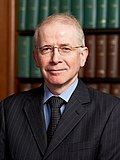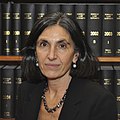List of judges of the Supreme Court
| Judge of the Supreme Court | Served from | Served until | Tenure length | Replacing | Previous judicial office | Notes | ||
|---|---|---|---|---|---|---|---|---|
| 1 |  | The Lord Phillips of Worth Matravers | 1 October 2009 | 30 September 2012 | 3 years and 0 days | Original justice | Senior Lord of Appeal in Ordinary (2008–2009) Lord Chief Justice of England and Wales (2005–2008) Master of the Rolls (2000–2005) Lord of Appeal in Ordinary (1999–2000) |
|
| 2 |  | The Lord Hope of Craighead | 1 October 2009 | 26 June 2013 | 3 years and 269 days | Original justice | Second Senior Lord of Appeal in Ordinary (2009) Lord of Appeal in Ordinary (1996–2009) Lord President of the Court of Session (1989–1996) |
|
| 3 |  | The Lord Saville of Newdigate | 1 October 2009 | 30 September 2010 | 1 year and 0 days | Original justice | Lord of Appeal in Ordinary (1997–2009) Lord Justice of Appeal (1994–1997) | |
| 4 |  | The Lord Collins of Mapesbury | 1 October 2009 | 7 May 2011 | 1 year and 219 days | Original justice | Lord of Appeal in Ordinary (2009) Lord Justice of Appeal (2007–2009) | |
| 5 | 1 October 2009 | 26 June 2011 | 1 year and 269 days | Original justice | Lord of Appeal in Ordinary (2001–2009) Lord President of the Court of Session (1996–2001) Senator of the College of Justice (1995–1996) |
| ||
| 6 |  | The Lord Brown of Eaton-under-Heywood | 1 October 2009 | 9 April 2012 | 2 years and 192 days | Original justice | Lord of Appeal in Ordinary (2004–2009) Lord Justice of Appeal (1992–2004) | |
| 7 |  | The Lord Walker of Gestingthorpe | 1 October 2009 | 17 March 2013 | 3 years and 174 days | Original justice | Lord of Appeal in Ordinary (2002–2009) Lord Justice of Appeal (1997–2002) | |
| 8 |  | The Lord Clarke of Stone-cum-Ebony | 1 October 2009 | 30 September 2017 | 8 years and 0 days | Original justice | Master of the Rolls (2005–2009) Lord Justice of Appeal (1998–2005) |
|
| 9 |  | The Lord Mance | 1 October 2009 | 6 June 2018 | 8 years and 249 days | Original justice | Lord of Appeal in Ordinary (2005–2009) Lord Justice of Appeal (1999–2005) |
|
| 10 |  | The Baroness Hale of Richmond | 1 October 2009 | 31 January 2020 | 10 years and 102 days | Original justice | Lord of Appeal in Ordinary (2004–2009) Lord Justice of Appeal (1999–2003) |
|
| 11 |  | The Lord Kerr of Tonaghmore | 1 October 2009 | 30 September 2020 | 11 years and 0 days | Original justice | Lord of Appeal in Ordinary (2009) Lord Chief Justice of Northern Ireland (2004–2009) |
|
| 12 |  | Lord Dyson | 13 April 2010 | 1 October 2012 | 2 years and 172 days | Original justice | Deputy Head of Civil Justice (2003–2006) Lord Justice of Appeal (2001–2010) |
|
| 13 |  | Lord Wilson of Culworth | 26 May 2011 | 9 May 2020 | 8 years and 350 days | The Lord Saville of Newdigate | Lord Justice of Appeal (2005–2011) | |
| 14 |  | Lord Sumption | 11 January 2012 | 9 December 2018 | 6 years and 333 days | The Lord Collins of Mapesbury | None (Queen's Counsel (1986–2012)) |
|
| 15 |  | The Lord Reed of Allermuir | 6 February 2012 | Incumbent | 13 years and 342 days | The Lord Rodger of Earlsferry | Senator of the College of Justice (1998–2012) |
|
| 16 |  | Lord Carnwath of Notting Hill | 17 April 2012 | 15 March 2020 | 7 years and 334 days | The Lord Brown of Eaton-under-Heywood | Lord Justice of Appeal (2002–2012) | |
| 17 |  | The Lord Neuberger of Abbotsbury | 1 October 2012 | 4 September 2017 | 4 years and 339 days | The Lord Phillips of Worth Matravers | Master of the Rolls (2009–2012) Lord of Appeal in Ordinary (2007–2009) Lord Justice of Appeal (2004–2007) |
|
| 18 |  | Lord Hughes of Ombersley | 9 April 2013 | 11 August 2018 | 5 years and 125 days | Lord Dyson | Vice President of the Criminal Division of the Court of Appeal (2009–2013) Lord Justice of Appeal (2006–2013) | |
| 19 |  | Lord Toulson | 9 April 2013 | 22 September 2016 | 3 years and 167 days | The Lord Walker of Gestingthorpe | Lord Justice of Appeal (2006–2013) Chairman of the Law Commission (2002–2006) | |
| 20 |  | Lord Hodge | 1 October 2013 | 31 December 2025 | 12 years and 105 days | The Lord Hope of Craighead | Senator of the College of Justice (2005–2013) |
|
| 21 |  | Lady Black of Derwent | 2 October 2017 | 10 January 2021 | 3 years and 101 days | Lord Toulson | Lord Justice of Appeal (2010–2017) Justice of the High Court, FD (1999–2010) | |
| 22 |  | Lord Lloyd-Jones | 2 October 2017 (first term)30 August 2022 (second term) | 13 January 2022 (first term) Incumbent (second term) | 4 years and 104 days (first term) 3 years and 137 days (second term) | The Lord Clarke of Stone-cum-Ebony Himself | Lord Justice of Appeal (2012–2017) Justice of the High Court, QBD (2005–2012) |
|
| 23 |  | Lord Briggs of Westbourne | 2 October 2017 | Incumbent | 8 years and 104 days | The Lord Neuberger of Abbotsbury | Lord Justice of Appeal (2013–2017) Justice of the High Court, CD (2006–2013) | |
| 24 |  | Lady Arden of Heswall | 1 October 2018 | 24 January 2022 | 3 years and 116 days | The Lord Mance | Lady Justice of Appeal (2000–2018) Justice of the High Court, CD (1993–2000) | |
| 25 |  | Lord Kitchin | 1 October 2018 | 29 September 2023 | 4 years and 364 days | Lord Hughes of Ombersley | Lord Justice of Appeal (2011–2018) Justice of the High Court, CD (2005–2011) | |
| 26 |  | Lord Sales | 11 January 2019 | Incumbent | 7 years and 3 days | Lord Sumption | Lord Justice of Appeal (2014–2019) Justice of the High Court, CD (2008–2014) |
|
| 27 |  | Lord Hamblen of Kersey | 13 January 2020 | Incumbent | 6 years and 1 day | The Baroness Hale of Richmond | Lord Justice of Appeal (2016–2020) Justice of the High Court, QBD (2008–2016) | |
| 28 |  | Lord Leggatt | 21 April 2020 | Incumbent | 5 years and 268 days | Lord Carnwath of Notting Hill | Lord Justice of Appeal (2018–2020) Justice of the High Court, QBD (2012–2018) | |
| 29 |  | Lord Burrows | 2 June 2020 | Incumbent | 5 years and 226 days | Lord Wilson of Culworth | None (Queen's Counsel (2003–2020)) |
|
| 30 |  | Lord Stephens of Creevyloughgare | 1 October 2020 | Incumbent | 5 years and 105 days | The Lord Kerr of Tonaghmore | Lord Justice of Appeal (NI) (2017–2200) Justice of the High Court (NI) (2007–2017) | |
| 31 |  | Lady Rose of Colmworth | 13 April 2021 | Incumbent | 4 years and 276 days | Lady Black of Derwent | Lady Justice of Appeal (2019–2021) Justice of the High Court, CD (2013–2019) | |
| 32 |  | Lord Richards of Camberwell | 3 October 2022 | Incumbent | 3 years and 103 days | Lady Arden of Heswall | Lord Justice of Appeal (2015–2021) Justice of the High Court, CD (2003–2015) | |
| 33 |  | Lady Simler | 14 November 2023 | Incumbent | 2 years and 61 days | Lord Kitchin | Lady Justice of Appeal (2019–2023) Justice of the High Court, QBD (2013–2019) | |
| 34 | Lord Doherty | 12 January 2026 | Incumbent | 2 days | Lord Hodge | Senator of the College of Justice (2010–2026) | ||
